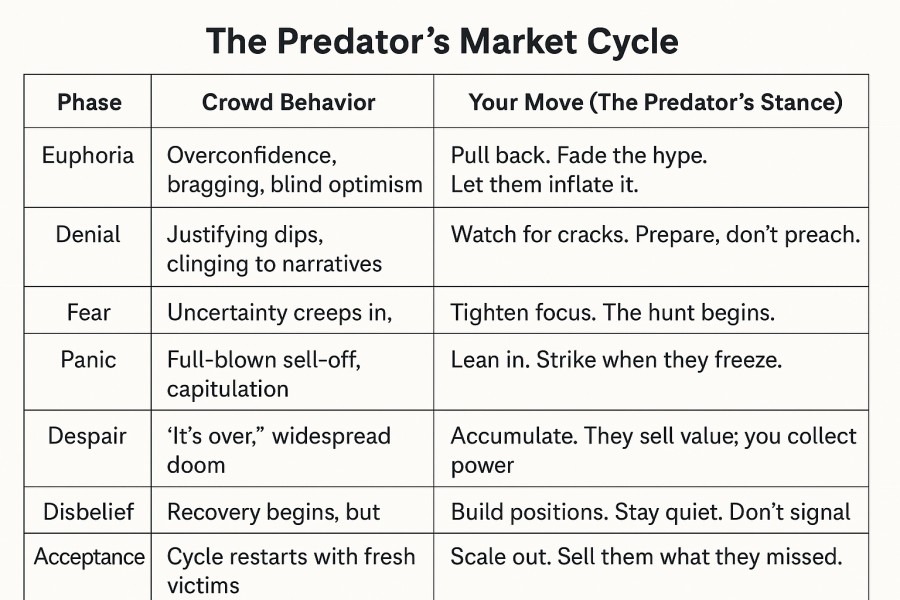Market Psychology: Why Delusions Repeat Across Every Cycle
Oct 22, 2025
Welcome to the battlefield of the markets, where fear and greed wage an endless war. In this high-stakes arena, the unprepared become prey, and only those who master their emotions survive.
Imagine a map that exposes the market’s emotional undercurrents—the irrational exuberance before a crash, the despair before a surge. That’s the power of the Stock Market Psychology Chart. It’s not just a guide—it’s a weapon.
Confucius warned, “Others will govern a man who cannot govern himself.” In the stock market, that ‘other’ is the crowd—blind, reactive, and dangerously predictable. Understanding mass psychology isn’t just useful; it’s the difference between profit and ruin.
This chart strips away illusions, revealing the rhythm of market sentiment. If you can read it, you can exploit the crowd, anticipate turning points, and act when others hesitate. Ready to stop reacting and start dominating? Let’s begin.
Mastering Market Psychology: Weaponising Emotional Cycles for Strategic Gain
Forget the myth: the market isn’t rational—it’s reactive, twitchy, and emotionally hijacked. The stock market psychology chart doesn’t track valuation alone; it maps mass behavioural fragility.
This chart captures the emotional arc of every market cycle—optimism, thrill, euphoria, anxiety, fear, panic, despair, and false hope. Each stage fuels decisions that move billions—blindly. Your job? Exploit that.
From Chart to Compass: Decoding Emotion for Strategic Advantage
- Euphoria isn’t success. It’s the final hallucination before collapse.
- Panic isn’t danger. It’s the moment the crowd gives you everything at a discount.
- Despair is the origin of generational wealth—but only for those willing to buy when it feels like death.
Most investors buy euphoria and sell despair. That’s the cycle. Understanding the chart helps you do the opposite—with conviction.
Conditioned by Chaos
Like Pavlov’s dogs, markets are conditioned. Traders react not to logic, but to signals—Fed headlines, CPI prints, earnings surprises. Even algorithms exhibit behavioural tics, triggering cascades that have nothing to do with fundamentals.
This isn’t random—it’s programmable emotion. Recognise the patterns, and you can predict chaos before it unfolds.
Rational Thinking in an Irrational Arena
The chart isn’t a crystal ball. But it’s a behavioral radar. It shows when sentiment detaches from reality—when the crowd becomes a trade.
By pairing this with technicals and layering in proprietary sentiment tools like our Anxiety Index, Stupidity Index, and Bull/Bear Sentiment Index, we don’t react—we strike.
No Room for Speculators
Want to buy high and pray it goes higher? Join the herd. Want to sell low and beg for a second chance? The market will let you—for a price.
But if you’re willing to discipline emotion, invert the cycle, and weaponize fear—you’re already ahead of 95% of the crowd.
At Tactical Investor, we don’t chase narratives. We decode mass behaviour. Then we act—with clarity, precision, and zero hesitation.
Navigating the Emotional Seas: The Stock Market Psychology Chart
The market isn’t driven by logic—it’s powered by panic, greed, denial, and hope. Data follows emotion. And emotion follows the herd.
The stock market psychology chart tracks more than price action. It tracks mass emotional volatility, mapping how sentiment surges and collapses across the cycle. It’s not a prediction tool—it’s a mirror, and most traders don’t like what it shows.
How It Works
- Horizontal Axis: Market valuation—oversold to overbought.
- Vertical Axis: Dominant emotion—despair to euphoria.
At market peaks, investors aren’t thinking—they’re dreaming. Euphoria blinds. In crashes, they’re not analysing—they’re drowning in fear. The wise see through both.
Core Emotional Signals
- Euphoria = herd blindness. Top is near.
- Despair = crowd collapse. Opportunity is forming.
- Hope = denial in disguise.
- Neutrality above 55%? That’s not balance. That’s a crowd cracking from within. A freeze before the quake.
Contrarians don’t avoid these zones—they hunt them.
Weaponising Sentiment: From Bias Trap to Tactical Edge
Most traders worship data. Few question the source of that data—human emotion. Fear, greed, hope, denial—they’re the fuel behind every chart spike and crash.
Stock market psychology charts expose this madness in motion. They’re not just visual tools—they’re extraction maps for the contrarian operator. Properly wielded, they help you:
- Cut through noise by tracking sentiment evolution—not price action alone.
- Detect reversals early when crowd emotion hits unsustainable highs or lows.
- Spot hidden cracks—like rising optimism despite weakening technicals.
- Avoid classic traps like overconfidence, herd mentality, and FOMO.
- Trigger bold contrarian plays just as the herd throws in the towel.
Extreme Greed? Signal to prep your exit.
Panic? Likely near a bottom.
Neutral above 55%? Don’t get fooled. That’s not indecision—it’s psychological pressure cracking from within. That’s when real shifts begin.
Anxiety Index hitting extremes? You’re standing at the inflection point. Direction depends on how deeply fear has rooted.
Stop Trading Blind
Overconfidence shows up as low volatility, bullish surveys, and an eerie absence of caution. These aren’t signs of strength—they’re precursors to collapse.
If the chart shows euphoria detached from fundamentals, tighten risk. Lighten up into overbought highs. The crowd’s certainty is your cue to become uncertain.
And when the data screams fear—when media panic surges, when put/call ratios spike, and everyone’s screaming “sell”—start sharpening your blades.
Rules of the Game
- Never bet on one signal. Corroborate with at least two more—sentiment, technicals, and macro context.
- Avoid blind spots. Ask: What does the crowd believe—and what’s the cost if they’re wrong?
- Don’t rush. Stagger in. Use stops. Expect fakeouts. Your job is survival, not perfection.
- Size matters. Know how much red you can bleed before the trade turns toxic.
Bottom Line?
Charts don’t lie—but people do, especially to themselves.
Those who master sentiment don’t just read the chart—they read the herd’s delusions, then trade against them.
They don’t follow trends.
They hunt the minds behind them.
Why This Matters
The table above is not an analysis; it is an orientation. It tracks emotional extremes, not forecasts, and that is where reversals are born. When paired with the Anxiety Index, it detects stress fractures in the crowd before the price acknowledges them.
It surfaces reversals while consensus still feels comfortable.
It strips emotion out of execution when pressure peaks.
It exposes mirages built on confidence, not cash flow.
Templeton had it right. Bear markets begin in pessimism and end in euphoria because psychology leads price, always.
Your edge is rare and straightforward: recognise the funeral while the crowd is still dancing.
The Inner Mechanics of Market Psychology: Where Traders Gain Their Edge
Markets are not charts. They are crowds under stress. Price is the footprint emotion leaves behind.
A stock market psychology chart is not decoration; it is an X-ray. It exposes the recurring conflict between fear and greed, a cycle older than exchanges themselves. The crowd sells when pain peaks and buys when comfort feels permanent. That rhythm never changes, only the costumes do.
The fear zone is capitulation, not caution. This is where selling becomes moral, necessary, and virtuous. Volume spikes because belief collapses. Sentiment sinks into extremes. Price stops falling not because news improves, but because sellers exhaust themselves. That is where accumulation begins, quietly, professionally, without applause.
Hope follows, then confidence, then greed. Momentum builds, and risk tolerance stretches. Valuations detach from cash flows. Warnings get mocked. At the top, euphoria does not feel reckless; it feels earned. That is why it ends badly.
The psychology chart compresses this cycle into something readable. It turns emotion into structure. It gives you distance when others lose it.
Conclusion: The Market Hunts Minds
The crowd panics. The crowd celebrates. The market does neither. It observes and exploits.
This is a mind game before it is a money game. Fear creates supply. Greed creates traps. Neutrality above 55% is not safe; it is tension before fracture.
Bravery in markets is not aggression. It is restrained under biological pressure. Acting on a signal while others react to sensation. Measuring while the herd flinches.
You are not here to feel right. You are here to read weakness and act without noise.
Track price if you want entries. Track psychology if you wish to survive.
You are either following the herd or studying where it breaks.
There is no third path.
Articles Worth Checking Out












